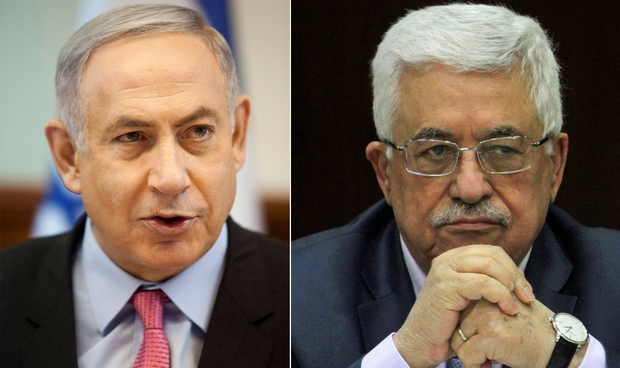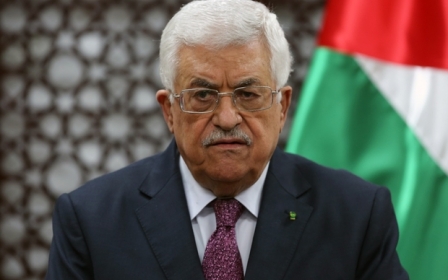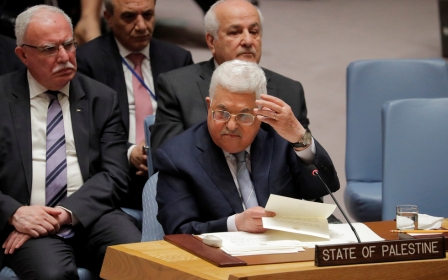Netanyahu calls Abbas 'anti-Semite' for saying Jews not persecuted for religion

Benjamin Netanyahu on Wednesday accused Mahmoud Abbas of anti-Semitism and Holocaust denial after the Palestinian leader suggested in a speech that the persecution of European Jews was because of their professions and not their religion.
Jewish groups also condemned Abbas' comments, made in a speech on Monday to the Palestinian National Council, that Jews had suffered historically because of their professions, such as banking.
"It would appear that, once a Holocaust denier, always a Holocaust denier," the Israeli prime minister said in one of a series of Twitter posts.
"I call upon the international community to condemn the grave anti-Semitism of Abu Mazen (Abbas), which should have long since passed from this world."
Abbas said in his speech that Jews living in Europe had suffered massacres "every 10 to 15 years in some country since the 11th century and until the Holocaust".
Citing books written by various authors, including communists Karl Marx, Isaac Deutscher and Arthur Koestler, and the Soviet dictator Stalin, Abbas said: "They say hatred against Jews was not because of their religion, it was because of their social profession.
"So the Jewish issue that had spread against the Jews across Europe was not because of their religion, it was because of their social professions such as usury and banks."
Abbas' comments came as he sought to give historical background on how Jewish leaders in Europe based their calls for the creation of Israel on religious persecution.
The Palestinian leader has stated his belief on several occasions in the past and received similar accusations that he is an anti-Semite.
However, Abbas has continually called for a two state solution to the Israeli-Palestinian question - essentially supporting Israel's right to exist.
The European Union's foreign service condemned his remarks, however, saying: "Such rhetoric will only play into the hands of those who do not want a two-state solution, which President Abbas has repeatedly advocated.
"The speech Palestinian President Mahmoud Abbas delivered on 30 April contained unacceptable remarks concerning the origins of the Holocaust and Israel's legitimacy."
"Anti-semitism is not only a threat for Jews but a fundamental menace to our open and liberal societies.
"The EU remains committed to combat any form of anti-semitism and any attempt to condone, justify or grossly trivialise the Holocaust."
"Classic anti-Semite"
Netanyahu's criticism was echoed by Jewish leaders around the world.
"Abbas' speech in Ramallah are the words of a classic anti-Semite," said Marvin Hier and Abraham Cooper of the US-based Jewish human rights organisation, the Simon Wiesenthal Centre.
The US ambassador to Israel, David Friedman, said on Twitter that Abbas had "reached a new low in attributing the cause of massacres of Jewish people over the years to their 'social behavior'."
Abbas' spokesman Nabil Abu Rudeineh declined comment on the criticism.
Abbas, 82, made his remarks in the West Bank city of Ramallah at a rare meeting of the Palestinian National Council, the de facto parliament of the Palestine Liberation Organisation (PLO), which Abbas heads.
A veteran member of Fatah, the dominant faction of the PLO, Abbas served for decades as a loyal deputy of his predecessor, Yasser Arafat. He assumed the leadership of Fatah, the PLO and the Palestinian Authority after Arafat died in 2004.
Abbas was born in 1935 in Safat, a town in the north of what was then British-ruled Palestine. His family became refugees in 1948, fleeing across the border to Syria as violence intensified between Jews and Arabs, culminating in war between the newly created state of Israel and its Arab neighbours in May 1948.
In 1982 Abbas obtained a doctorate in history at the Moscow Institute of Orientalism in the then-Soviet Union. His dissertation, entitled "The Secret Relationship between Nazism and the Zionist Movement", drew widespread criticism from Jewish groups, who accused him of Holocaust denial.
New MEE newsletter: Jerusalem Dispatch
Sign up to get the latest insights and analysis on Israel-Palestine, alongside Turkey Unpacked and other MEE newsletters
Middle East Eye delivers independent and unrivalled coverage and analysis of the Middle East, North Africa and beyond. To learn more about republishing this content and the associated fees, please fill out this form. More about MEE can be found here.




